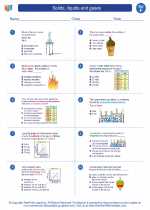Biogeochemical Cycles
Biogeochemical cycles are pathways through which nutrients and elements are exchanged between living organisms, the environment, and the atmosphere. These cycles are essential for the functioning of ecosystems and the maintenance of life on Earth.
Types of Biogeochemical Cycles
There are several major biogeochemical cycles that play crucial roles in ecological systems:
- Water Cycle: The water cycle involves the continuous movement of water between the atmosphere, land, and oceans through processes such as evaporation, condensation, precipitation, and runoff.
- Carbon Cycle: The carbon cycle describes the movement of carbon through the atmosphere, biosphere, geosphere, and hydrosphere. It involves processes such as photosynthesis, respiration, and decomposition.
- Nitrogen Cycle: The nitrogen cycle encompasses the various processes by which nitrogen is converted and circulated between the atmosphere, soil, and living organisms. This includes nitrogen fixation, nitrification, and denitrification.
- Phosphorus Cycle: The phosphorus cycle involves the movement of phosphorus through the lithosphere, hydrosphere, and biosphere. Weathering of rocks, erosion, and biological processes contribute to the cycling of phosphorus.
- Sulfur Cycle: The sulfur cycle includes the movement of sulfur through the atmosphere, lithosphere, and hydrosphere. Processes such as volcanic activity, weathering, and microbial activity contribute to sulfur cycling.
Importance of Biogeochemical Cycles
Biogeochemical cycles are vital for the sustainability of life on Earth. They regulate the availability of essential nutrients for organisms, influence the composition of the atmosphere, and contribute to the overall functioning of ecosystems. Understanding these cycles is crucial for addressing environmental issues and managing natural resources effectively.
Study Guide
To study biogeochemical cycles effectively, consider the following key points:
- Understand the processes involved in each biogeochemical cycle, including the specific pathways and transformations that occur.
- Learn about the key players in each cycle, such as the organisms and environmental factors that drive the cycling of nutrients and elements.
- Explore the connections between different biogeochemical cycles and how they interact within ecosystems.
- Examine the impact of human activities on biogeochemical cycles and the environment, including issues such as pollution and resource management.
- Utilize diagrams and visual aids to help visualize the pathways and dynamics of biogeochemical cycles.
By mastering the concepts and intricacies of biogeochemical cycles, you can develop a deeper understanding of the interconnectedness of Earth's systems and the significance of maintaining ecological balance.
.◂Science Worksheets and Study Guides Sixth Grade. Solids, liquids and gases

 Activity Lesson
Activity Lesson
 Worksheet/Answer key
Worksheet/Answer key
 Worksheet/Answer key
Worksheet/Answer key
 Worksheet/Answer key
Worksheet/Answer key
 Vocabulary/Answer key
Vocabulary/Answer key
 Vocabulary/Answer key
Vocabulary/Answer key
